Comprehensive Analysis of Leadership and Management at Tesco: Report
VerifiedAdded on 2023/01/06
|12
|3772
|99
Report
AI Summary
This report provides a comprehensive analysis of leadership and management practices within Tesco, a multinational retail company. It begins by defining and comparing the roles and characteristics of leaders and managers, differentiating between their responsibilities and skills. The report then examines how these roles apply in different situational contexts, such as stable and fast-changing environments, considering the impact of external factors like market conditions and economic fluctuations. Furthermore, the report applies various leadership theories and models, including situational leadership, systems leadership, and Fiedler’s contingency model, to the context of Tesco, providing insights into effective leadership strategies. The report emphasizes the importance of adapting leadership styles to suit specific situations and challenges faced by the company. The report provides a comprehensive overview of leadership and management in a real-world business setting, making it a valuable resource for students and professionals alike.
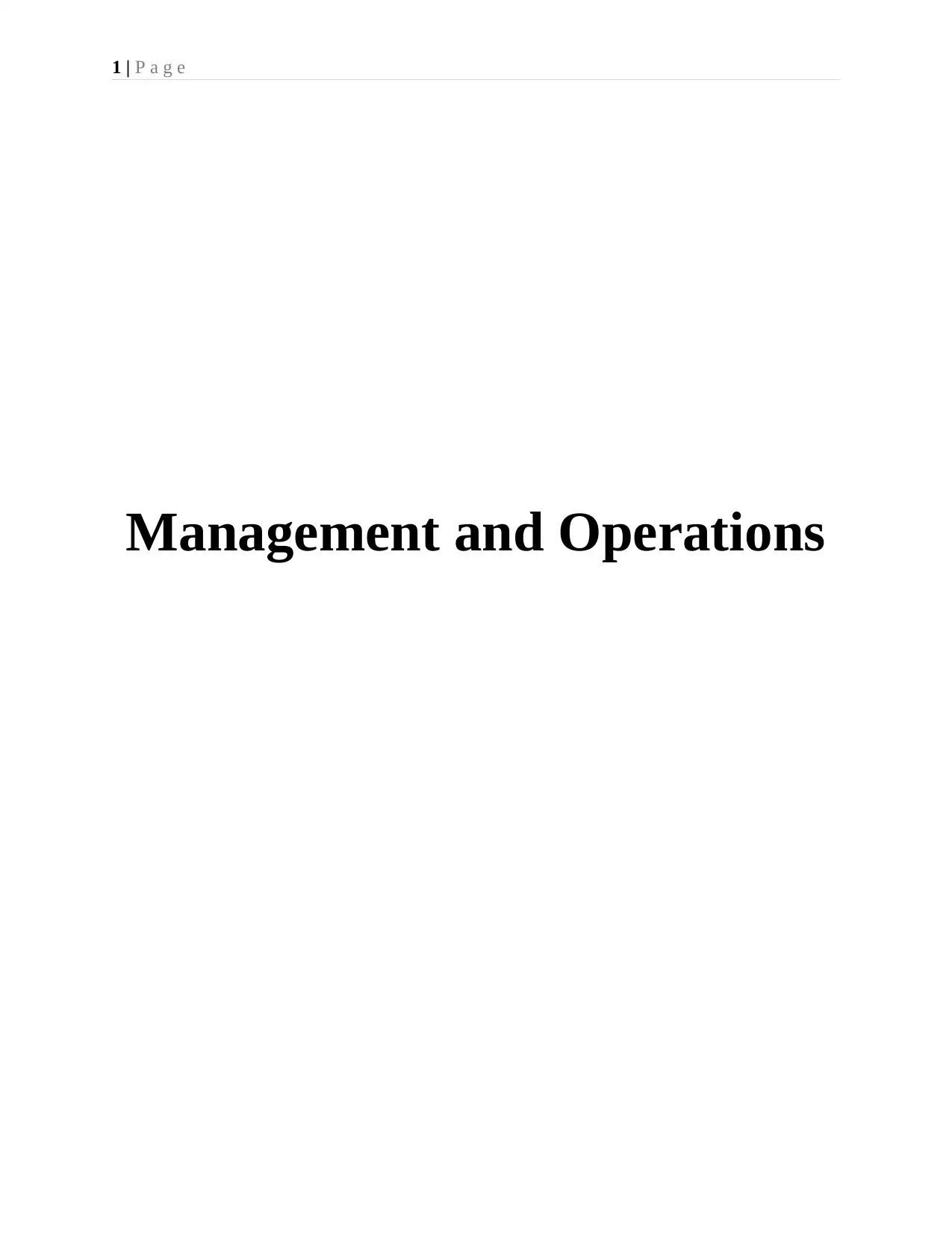
1 | P a g e
Management and Operations
Management and Operations
Paraphrase This Document
Need a fresh take? Get an instant paraphrase of this document with our AI Paraphraser
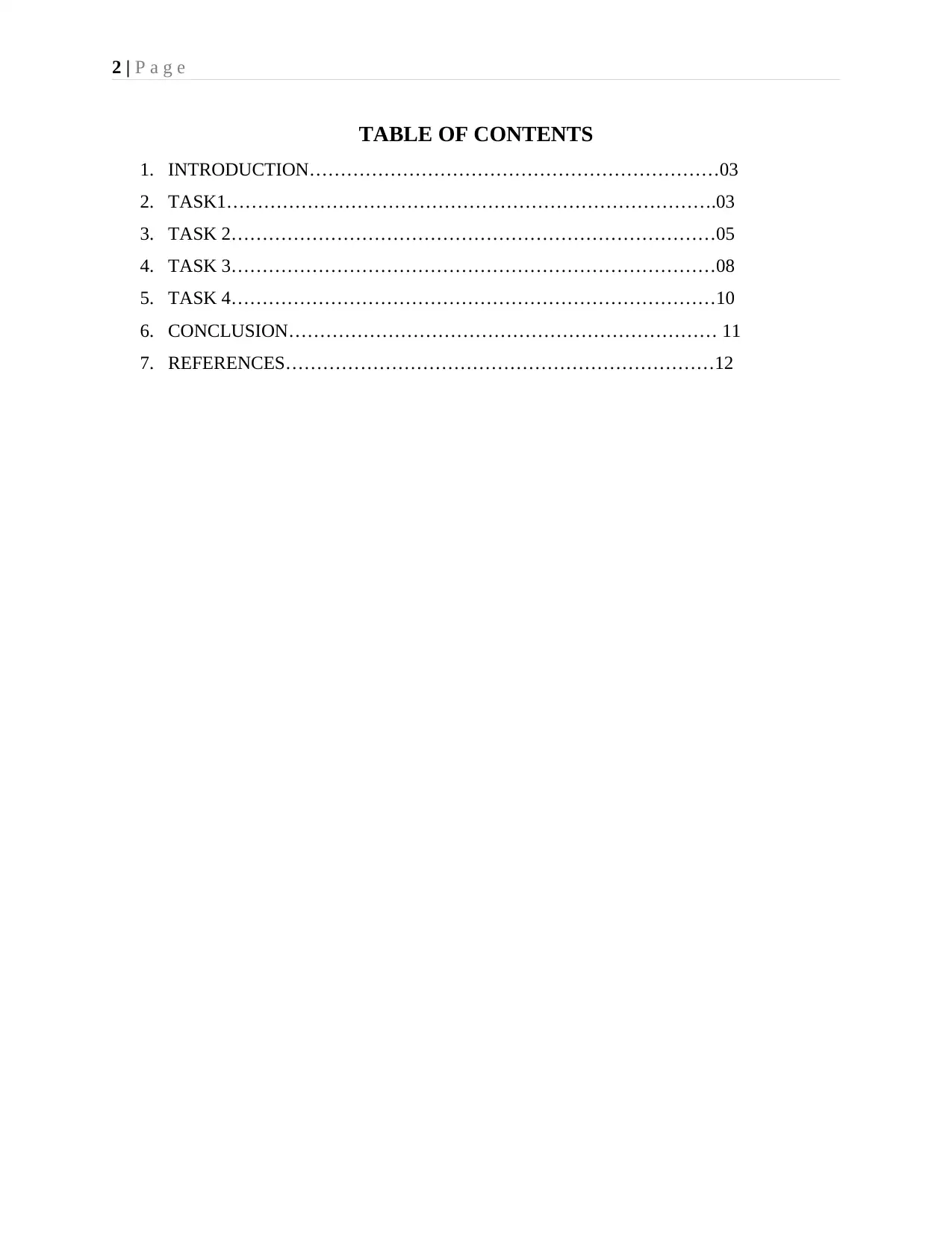
2 | P a g e
TABLE OF CONTENTS
1. INTRODUCTION…………………………………………………………03
2. TASK1…………………………………………………………………….03
3. TASK 2……………………………………………………………………05
4. TASK 3……………………………………………………………………08
5. TASK 4……………………………………………………………………10
6. CONCLUSION…………………………………………………………… 11
7. REFERENCES……………………………………………………………12
TABLE OF CONTENTS
1. INTRODUCTION…………………………………………………………03
2. TASK1…………………………………………………………………….03
3. TASK 2……………………………………………………………………05
4. TASK 3……………………………………………………………………08
5. TASK 4……………………………………………………………………10
6. CONCLUSION…………………………………………………………… 11
7. REFERENCES……………………………………………………………12
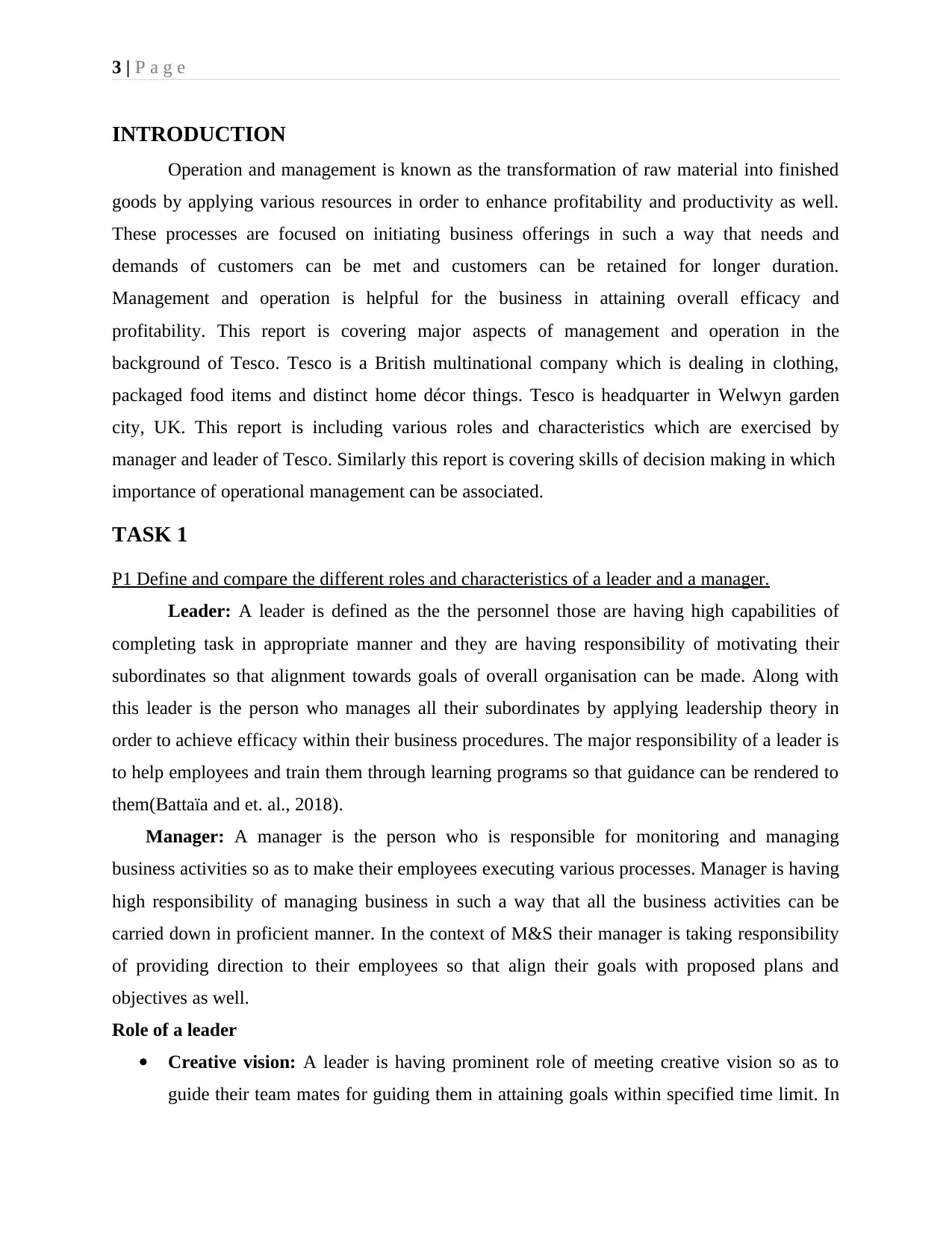
3 | P a g e
INTRODUCTION
Operation and management is known as the transformation of raw material into finished
goods by applying various resources in order to enhance profitability and productivity as well.
These processes are focused on initiating business offerings in such a way that needs and
demands of customers can be met and customers can be retained for longer duration.
Management and operation is helpful for the business in attaining overall efficacy and
profitability. This report is covering major aspects of management and operation in the
background of Tesco. Tesco is a British multinational company which is dealing in clothing,
packaged food items and distinct home décor things. Tesco is headquarter in Welwyn garden
city, UK. This report is including various roles and characteristics which are exercised by
manager and leader of Tesco. Similarly this report is covering skills of decision making in which
importance of operational management can be associated.
TASK 1
P1 Define and compare the different roles and characteristics of a leader and a manager.
Leader: A leader is defined as the the personnel those are having high capabilities of
completing task in appropriate manner and they are having responsibility of motivating their
subordinates so that alignment towards goals of overall organisation can be made. Along with
this leader is the person who manages all their subordinates by applying leadership theory in
order to achieve efficacy within their business procedures. The major responsibility of a leader is
to help employees and train them through learning programs so that guidance can be rendered to
them(Battaïa and et. al., 2018).
Manager: A manager is the person who is responsible for monitoring and managing
business activities so as to make their employees executing various processes. Manager is having
high responsibility of managing business in such a way that all the business activities can be
carried down in proficient manner. In the context of M&S their manager is taking responsibility
of providing direction to their employees so that align their goals with proposed plans and
objectives as well.
Role of a leader
Creative vision: A leader is having prominent role of meeting creative vision so as to
guide their team mates for guiding them in attaining goals within specified time limit. In
INTRODUCTION
Operation and management is known as the transformation of raw material into finished
goods by applying various resources in order to enhance profitability and productivity as well.
These processes are focused on initiating business offerings in such a way that needs and
demands of customers can be met and customers can be retained for longer duration.
Management and operation is helpful for the business in attaining overall efficacy and
profitability. This report is covering major aspects of management and operation in the
background of Tesco. Tesco is a British multinational company which is dealing in clothing,
packaged food items and distinct home décor things. Tesco is headquarter in Welwyn garden
city, UK. This report is including various roles and characteristics which are exercised by
manager and leader of Tesco. Similarly this report is covering skills of decision making in which
importance of operational management can be associated.
TASK 1
P1 Define and compare the different roles and characteristics of a leader and a manager.
Leader: A leader is defined as the the personnel those are having high capabilities of
completing task in appropriate manner and they are having responsibility of motivating their
subordinates so that alignment towards goals of overall organisation can be made. Along with
this leader is the person who manages all their subordinates by applying leadership theory in
order to achieve efficacy within their business procedures. The major responsibility of a leader is
to help employees and train them through learning programs so that guidance can be rendered to
them(Battaïa and et. al., 2018).
Manager: A manager is the person who is responsible for monitoring and managing
business activities so as to make their employees executing various processes. Manager is having
high responsibility of managing business in such a way that all the business activities can be
carried down in proficient manner. In the context of M&S their manager is taking responsibility
of providing direction to their employees so that align their goals with proposed plans and
objectives as well.
Role of a leader
Creative vision: A leader is having prominent role of meeting creative vision so as to
guide their team mates for guiding them in attaining goals within specified time limit. In
⊘ This is a preview!⊘
Do you want full access?
Subscribe today to unlock all pages.

Trusted by 1+ million students worldwide
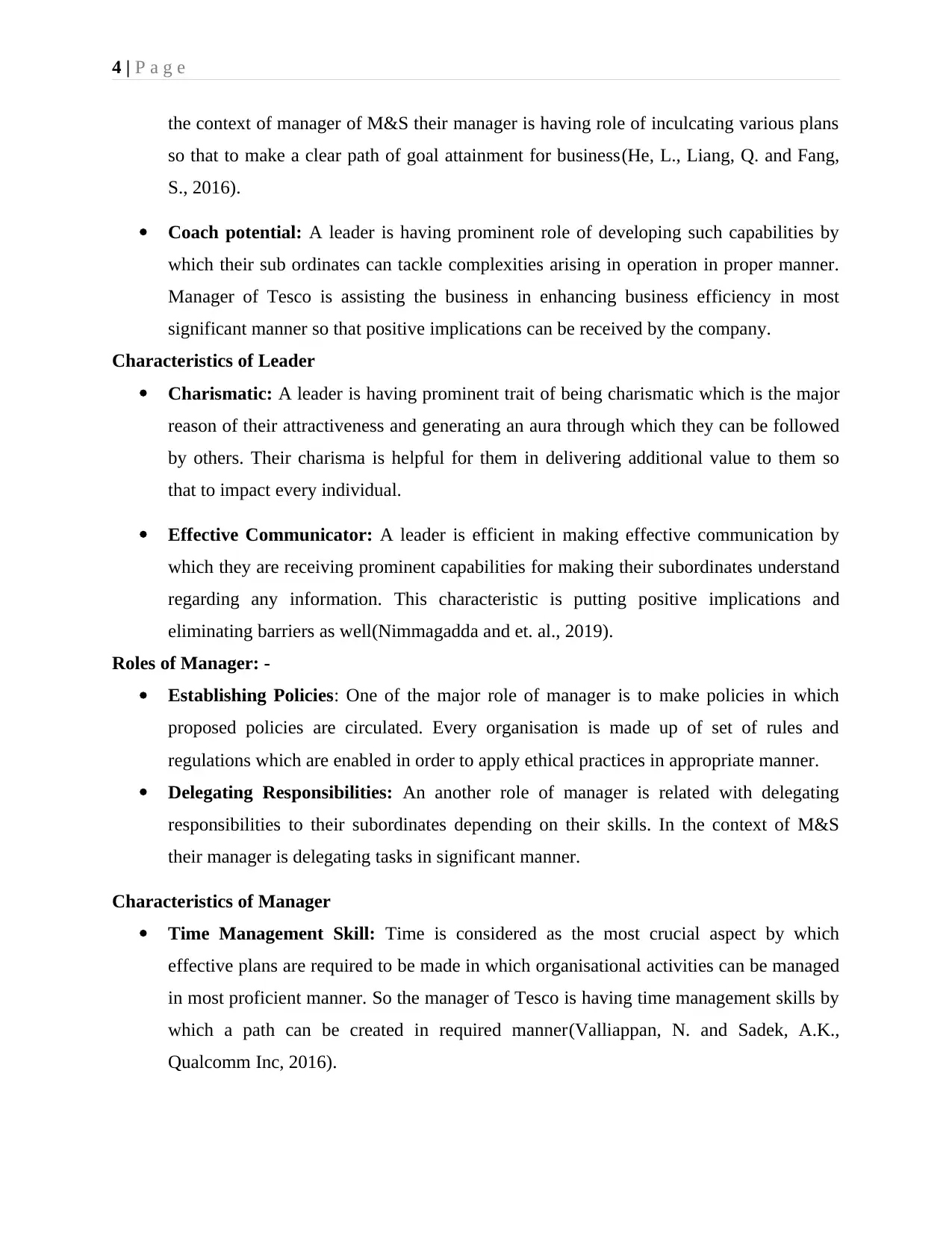
4 | P a g e
the context of manager of M&S their manager is having role of inculcating various plans
so that to make a clear path of goal attainment for business(He, L., Liang, Q. and Fang,
S., 2016).
Coach potential: A leader is having prominent role of developing such capabilities by
which their sub ordinates can tackle complexities arising in operation in proper manner.
Manager of Tesco is assisting the business in enhancing business efficiency in most
significant manner so that positive implications can be received by the company.
Characteristics of Leader
Charismatic: A leader is having prominent trait of being charismatic which is the major
reason of their attractiveness and generating an aura through which they can be followed
by others. Their charisma is helpful for them in delivering additional value to them so
that to impact every individual.
Effective Communicator: A leader is efficient in making effective communication by
which they are receiving prominent capabilities for making their subordinates understand
regarding any information. This characteristic is putting positive implications and
eliminating barriers as well(Nimmagadda and et. al., 2019).
Roles of Manager: -
Establishing Policies: One of the major role of manager is to make policies in which
proposed policies are circulated. Every organisation is made up of set of rules and
regulations which are enabled in order to apply ethical practices in appropriate manner.
Delegating Responsibilities: An another role of manager is related with delegating
responsibilities to their subordinates depending on their skills. In the context of M&S
their manager is delegating tasks in significant manner.
Characteristics of Manager
Time Management Skill: Time is considered as the most crucial aspect by which
effective plans are required to be made in which organisational activities can be managed
in most proficient manner. So the manager of Tesco is having time management skills by
which a path can be created in required manner(Valliappan, N. and Sadek, A.K.,
Qualcomm Inc, 2016).
the context of manager of M&S their manager is having role of inculcating various plans
so that to make a clear path of goal attainment for business(He, L., Liang, Q. and Fang,
S., 2016).
Coach potential: A leader is having prominent role of developing such capabilities by
which their sub ordinates can tackle complexities arising in operation in proper manner.
Manager of Tesco is assisting the business in enhancing business efficiency in most
significant manner so that positive implications can be received by the company.
Characteristics of Leader
Charismatic: A leader is having prominent trait of being charismatic which is the major
reason of their attractiveness and generating an aura through which they can be followed
by others. Their charisma is helpful for them in delivering additional value to them so
that to impact every individual.
Effective Communicator: A leader is efficient in making effective communication by
which they are receiving prominent capabilities for making their subordinates understand
regarding any information. This characteristic is putting positive implications and
eliminating barriers as well(Nimmagadda and et. al., 2019).
Roles of Manager: -
Establishing Policies: One of the major role of manager is to make policies in which
proposed policies are circulated. Every organisation is made up of set of rules and
regulations which are enabled in order to apply ethical practices in appropriate manner.
Delegating Responsibilities: An another role of manager is related with delegating
responsibilities to their subordinates depending on their skills. In the context of M&S
their manager is delegating tasks in significant manner.
Characteristics of Manager
Time Management Skill: Time is considered as the most crucial aspect by which
effective plans are required to be made in which organisational activities can be managed
in most proficient manner. So the manager of Tesco is having time management skills by
which a path can be created in required manner(Valliappan, N. and Sadek, A.K.,
Qualcomm Inc, 2016).
Paraphrase This Document
Need a fresh take? Get an instant paraphrase of this document with our AI Paraphraser
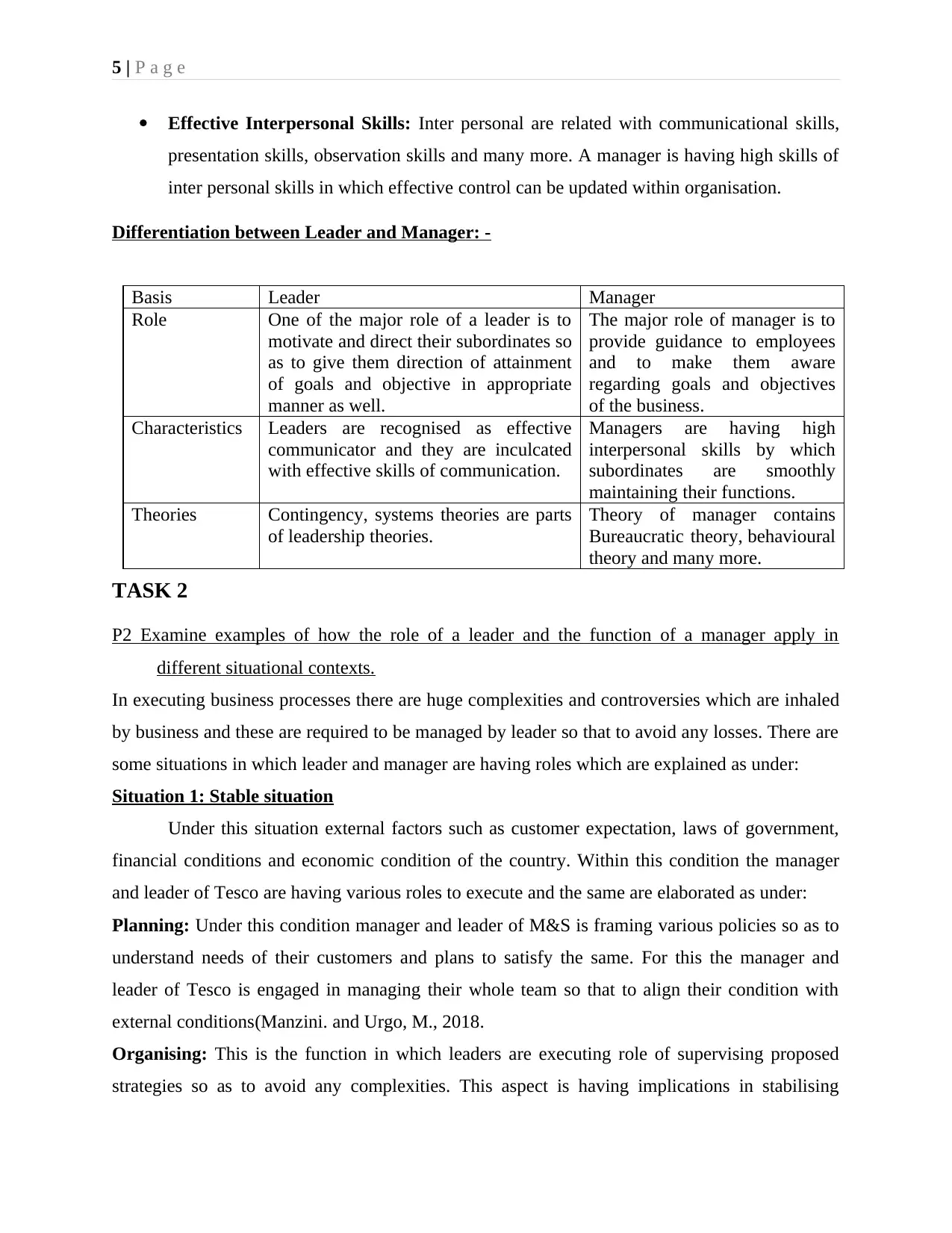
5 | P a g e
Effective Interpersonal Skills: Inter personal are related with communicational skills,
presentation skills, observation skills and many more. A manager is having high skills of
inter personal skills in which effective control can be updated within organisation.
Differentiation between Leader and Manager: -
Basis Leader Manager
Role One of the major role of a leader is to
motivate and direct their subordinates so
as to give them direction of attainment
of goals and objective in appropriate
manner as well.
The major role of manager is to
provide guidance to employees
and to make them aware
regarding goals and objectives
of the business.
Characteristics Leaders are recognised as effective
communicator and they are inculcated
with effective skills of communication.
Managers are having high
interpersonal skills by which
subordinates are smoothly
maintaining their functions.
Theories Contingency, systems theories are parts
of leadership theories.
Theory of manager contains
Bureaucratic theory, behavioural
theory and many more.
TASK 2
P2 Examine examples of how the role of a leader and the function of a manager apply in
different situational contexts.
In executing business processes there are huge complexities and controversies which are inhaled
by business and these are required to be managed by leader so that to avoid any losses. There are
some situations in which leader and manager are having roles which are explained as under:
Situation 1: Stable situation
Under this situation external factors such as customer expectation, laws of government,
financial conditions and economic condition of the country. Within this condition the manager
and leader of Tesco are having various roles to execute and the same are elaborated as under:
Planning: Under this condition manager and leader of M&S is framing various policies so as to
understand needs of their customers and plans to satisfy the same. For this the manager and
leader of Tesco is engaged in managing their whole team so that to align their condition with
external conditions(Manzini. and Urgo, M., 2018.
Organising: This is the function in which leaders are executing role of supervising proposed
strategies so as to avoid any complexities. This aspect is having implications in stabilising
Effective Interpersonal Skills: Inter personal are related with communicational skills,
presentation skills, observation skills and many more. A manager is having high skills of
inter personal skills in which effective control can be updated within organisation.
Differentiation between Leader and Manager: -
Basis Leader Manager
Role One of the major role of a leader is to
motivate and direct their subordinates so
as to give them direction of attainment
of goals and objective in appropriate
manner as well.
The major role of manager is to
provide guidance to employees
and to make them aware
regarding goals and objectives
of the business.
Characteristics Leaders are recognised as effective
communicator and they are inculcated
with effective skills of communication.
Managers are having high
interpersonal skills by which
subordinates are smoothly
maintaining their functions.
Theories Contingency, systems theories are parts
of leadership theories.
Theory of manager contains
Bureaucratic theory, behavioural
theory and many more.
TASK 2
P2 Examine examples of how the role of a leader and the function of a manager apply in
different situational contexts.
In executing business processes there are huge complexities and controversies which are inhaled
by business and these are required to be managed by leader so that to avoid any losses. There are
some situations in which leader and manager are having roles which are explained as under:
Situation 1: Stable situation
Under this situation external factors such as customer expectation, laws of government,
financial conditions and economic condition of the country. Within this condition the manager
and leader of Tesco are having various roles to execute and the same are elaborated as under:
Planning: Under this condition manager and leader of M&S is framing various policies so as to
understand needs of their customers and plans to satisfy the same. For this the manager and
leader of Tesco is engaged in managing their whole team so that to align their condition with
external conditions(Manzini. and Urgo, M., 2018.
Organising: This is the function in which leaders are executing role of supervising proposed
strategies so as to avoid any complexities. This aspect is having implications in stabilising
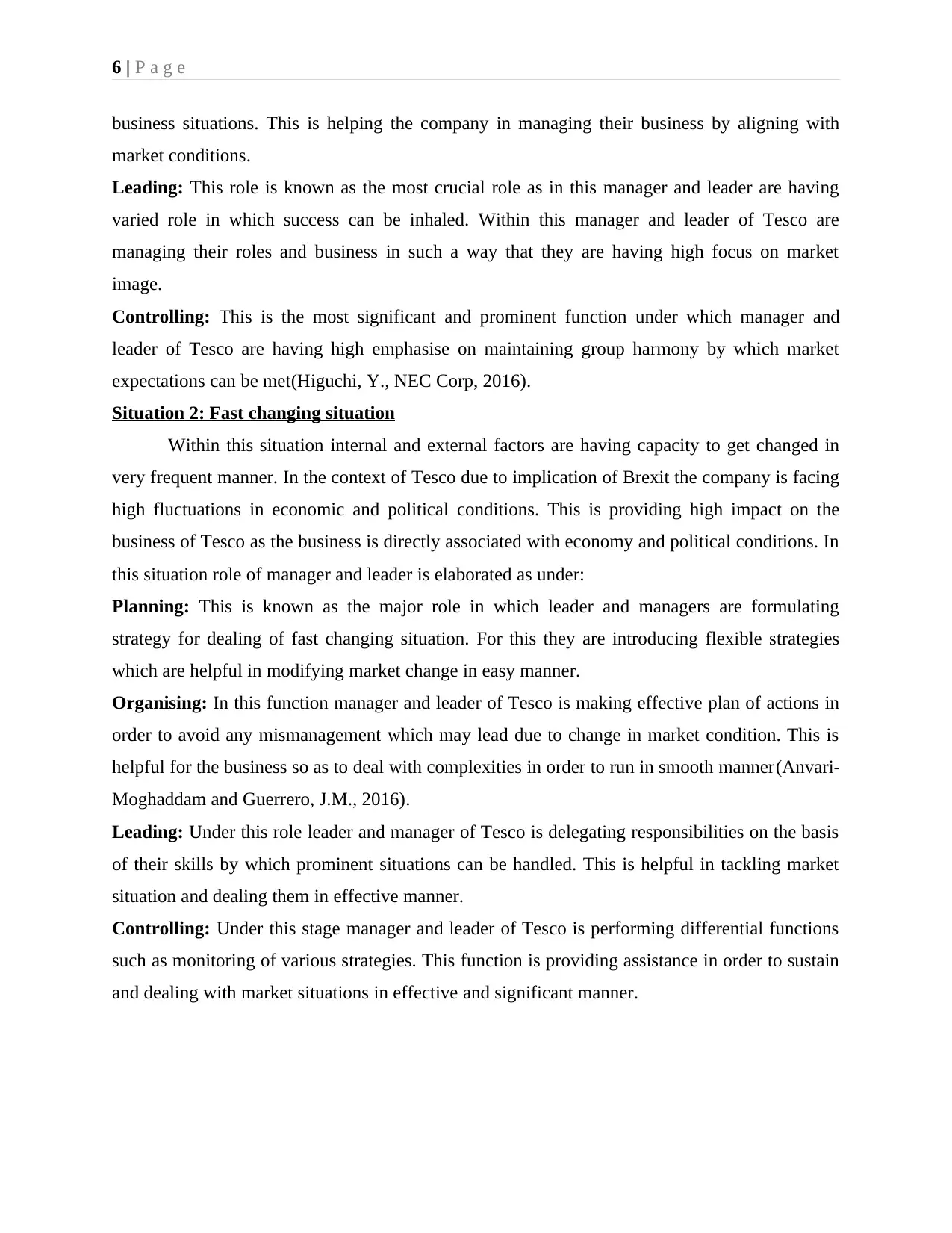
6 | P a g e
business situations. This is helping the company in managing their business by aligning with
market conditions.
Leading: This role is known as the most crucial role as in this manager and leader are having
varied role in which success can be inhaled. Within this manager and leader of Tesco are
managing their roles and business in such a way that they are having high focus on market
image.
Controlling: This is the most significant and prominent function under which manager and
leader of Tesco are having high emphasise on maintaining group harmony by which market
expectations can be met(Higuchi, Y., NEC Corp, 2016).
Situation 2: Fast changing situation
Within this situation internal and external factors are having capacity to get changed in
very frequent manner. In the context of Tesco due to implication of Brexit the company is facing
high fluctuations in economic and political conditions. This is providing high impact on the
business of Tesco as the business is directly associated with economy and political conditions. In
this situation role of manager and leader is elaborated as under:
Planning: This is known as the major role in which leader and managers are formulating
strategy for dealing of fast changing situation. For this they are introducing flexible strategies
which are helpful in modifying market change in easy manner.
Organising: In this function manager and leader of Tesco is making effective plan of actions in
order to avoid any mismanagement which may lead due to change in market condition. This is
helpful for the business so as to deal with complexities in order to run in smooth manner(Anvari-
Moghaddam and Guerrero, J.M., 2016).
Leading: Under this role leader and manager of Tesco is delegating responsibilities on the basis
of their skills by which prominent situations can be handled. This is helpful in tackling market
situation and dealing them in effective manner.
Controlling: Under this stage manager and leader of Tesco is performing differential functions
such as monitoring of various strategies. This function is providing assistance in order to sustain
and dealing with market situations in effective and significant manner.
business situations. This is helping the company in managing their business by aligning with
market conditions.
Leading: This role is known as the most crucial role as in this manager and leader are having
varied role in which success can be inhaled. Within this manager and leader of Tesco are
managing their roles and business in such a way that they are having high focus on market
image.
Controlling: This is the most significant and prominent function under which manager and
leader of Tesco are having high emphasise on maintaining group harmony by which market
expectations can be met(Higuchi, Y., NEC Corp, 2016).
Situation 2: Fast changing situation
Within this situation internal and external factors are having capacity to get changed in
very frequent manner. In the context of Tesco due to implication of Brexit the company is facing
high fluctuations in economic and political conditions. This is providing high impact on the
business of Tesco as the business is directly associated with economy and political conditions. In
this situation role of manager and leader is elaborated as under:
Planning: This is known as the major role in which leader and managers are formulating
strategy for dealing of fast changing situation. For this they are introducing flexible strategies
which are helpful in modifying market change in easy manner.
Organising: In this function manager and leader of Tesco is making effective plan of actions in
order to avoid any mismanagement which may lead due to change in market condition. This is
helpful for the business so as to deal with complexities in order to run in smooth manner(Anvari-
Moghaddam and Guerrero, J.M., 2016).
Leading: Under this role leader and manager of Tesco is delegating responsibilities on the basis
of their skills by which prominent situations can be handled. This is helpful in tackling market
situation and dealing them in effective manner.
Controlling: Under this stage manager and leader of Tesco is performing differential functions
such as monitoring of various strategies. This function is providing assistance in order to sustain
and dealing with market situations in effective and significant manner.
⊘ This is a preview!⊘
Do you want full access?
Subscribe today to unlock all pages.

Trusted by 1+ million students worldwide
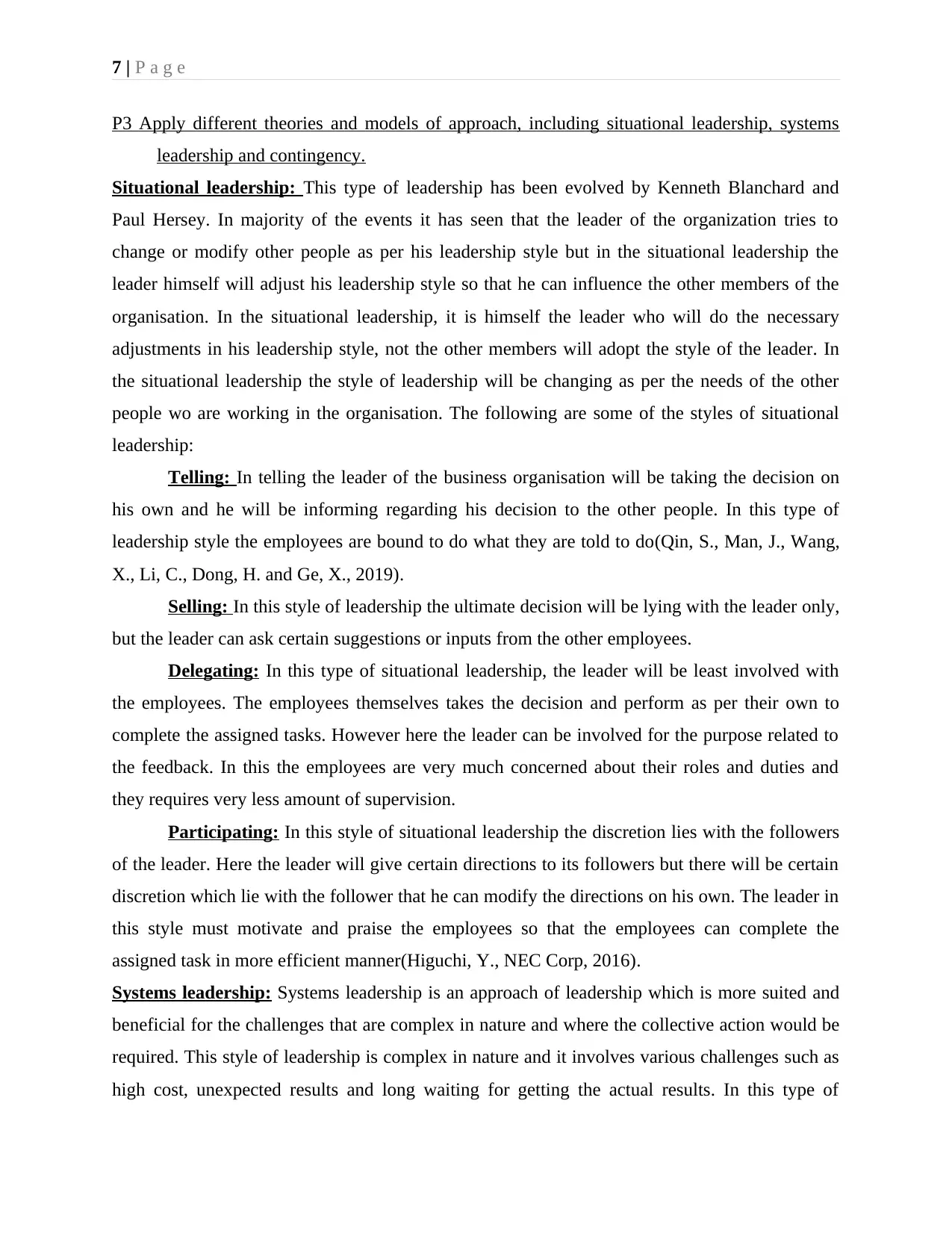
7 | P a g e
P3 Apply different theories and models of approach, including situational leadership, systems
leadership and contingency.
Situational leadership: This type of leadership has been evolved by Kenneth Blanchard and
Paul Hersey. In majority of the events it has seen that the leader of the organization tries to
change or modify other people as per his leadership style but in the situational leadership the
leader himself will adjust his leadership style so that he can influence the other members of the
organisation. In the situational leadership, it is himself the leader who will do the necessary
adjustments in his leadership style, not the other members will adopt the style of the leader. In
the situational leadership the style of leadership will be changing as per the needs of the other
people wo are working in the organisation. The following are some of the styles of situational
leadership:
Telling: In telling the leader of the business organisation will be taking the decision on
his own and he will be informing regarding his decision to the other people. In this type of
leadership style the employees are bound to do what they are told to do(Qin, S., Man, J., Wang,
X., Li, C., Dong, H. and Ge, X., 2019).
Selling: In this style of leadership the ultimate decision will be lying with the leader only,
but the leader can ask certain suggestions or inputs from the other employees.
Delegating: In this type of situational leadership, the leader will be least involved with
the employees. The employees themselves takes the decision and perform as per their own to
complete the assigned tasks. However here the leader can be involved for the purpose related to
the feedback. In this the employees are very much concerned about their roles and duties and
they requires very less amount of supervision.
Participating: In this style of situational leadership the discretion lies with the followers
of the leader. Here the leader will give certain directions to its followers but there will be certain
discretion which lie with the follower that he can modify the directions on his own. The leader in
this style must motivate and praise the employees so that the employees can complete the
assigned task in more efficient manner(Higuchi, Y., NEC Corp, 2016).
Systems leadership: Systems leadership is an approach of leadership which is more suited and
beneficial for the challenges that are complex in nature and where the collective action would be
required. This style of leadership is complex in nature and it involves various challenges such as
high cost, unexpected results and long waiting for getting the actual results. In this type of
P3 Apply different theories and models of approach, including situational leadership, systems
leadership and contingency.
Situational leadership: This type of leadership has been evolved by Kenneth Blanchard and
Paul Hersey. In majority of the events it has seen that the leader of the organization tries to
change or modify other people as per his leadership style but in the situational leadership the
leader himself will adjust his leadership style so that he can influence the other members of the
organisation. In the situational leadership, it is himself the leader who will do the necessary
adjustments in his leadership style, not the other members will adopt the style of the leader. In
the situational leadership the style of leadership will be changing as per the needs of the other
people wo are working in the organisation. The following are some of the styles of situational
leadership:
Telling: In telling the leader of the business organisation will be taking the decision on
his own and he will be informing regarding his decision to the other people. In this type of
leadership style the employees are bound to do what they are told to do(Qin, S., Man, J., Wang,
X., Li, C., Dong, H. and Ge, X., 2019).
Selling: In this style of leadership the ultimate decision will be lying with the leader only,
but the leader can ask certain suggestions or inputs from the other employees.
Delegating: In this type of situational leadership, the leader will be least involved with
the employees. The employees themselves takes the decision and perform as per their own to
complete the assigned tasks. However here the leader can be involved for the purpose related to
the feedback. In this the employees are very much concerned about their roles and duties and
they requires very less amount of supervision.
Participating: In this style of situational leadership the discretion lies with the followers
of the leader. Here the leader will give certain directions to its followers but there will be certain
discretion which lie with the follower that he can modify the directions on his own. The leader in
this style must motivate and praise the employees so that the employees can complete the
assigned task in more efficient manner(Higuchi, Y., NEC Corp, 2016).
Systems leadership: Systems leadership is an approach of leadership which is more suited and
beneficial for the challenges that are complex in nature and where the collective action would be
required. This style of leadership is complex in nature and it involves various challenges such as
high cost, unexpected results and long waiting for getting the actual results. In this type of
Paraphrase This Document
Need a fresh take? Get an instant paraphrase of this document with our AI Paraphraser
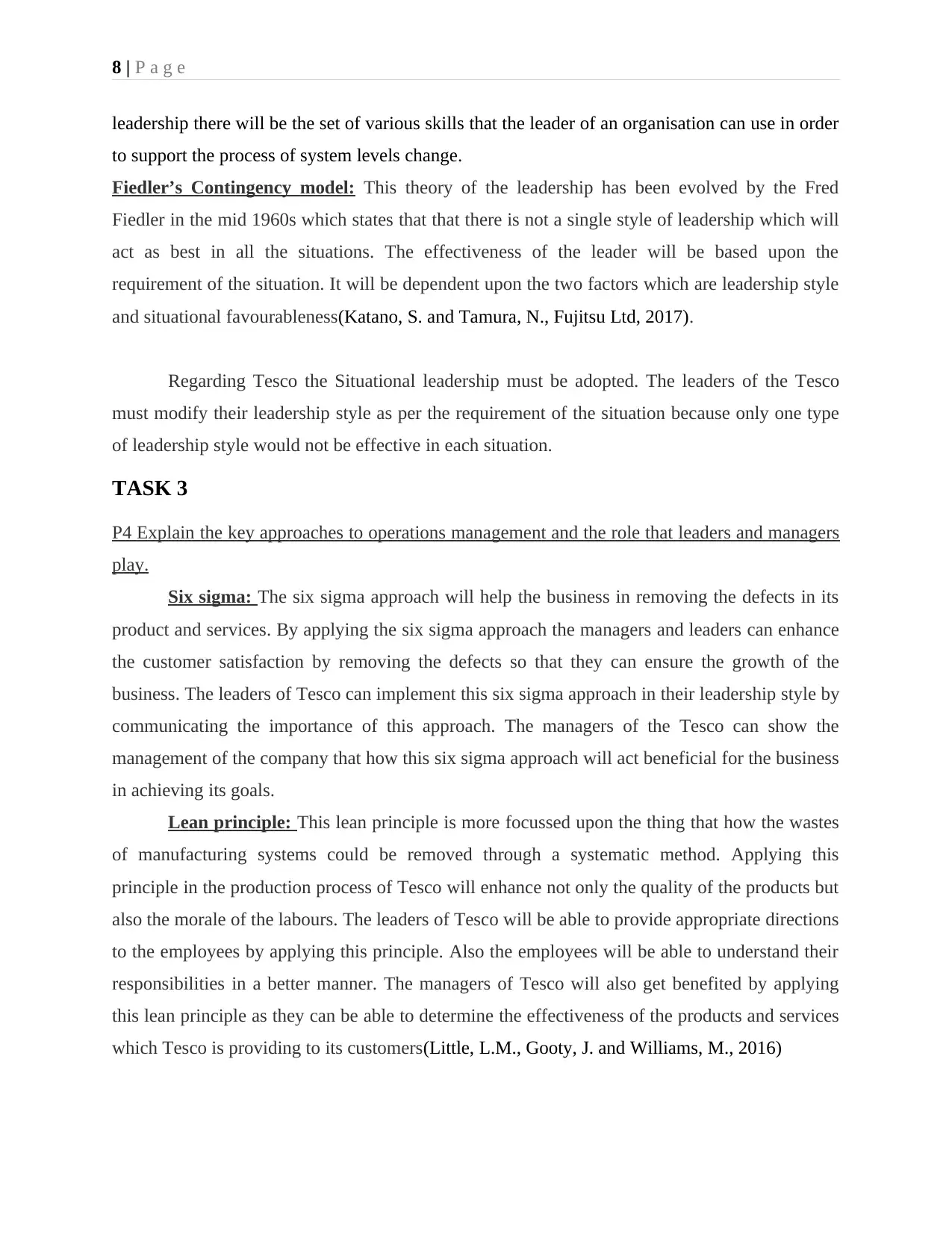
8 | P a g e
leadership there will be the set of various skills that the leader of an organisation can use in order
to support the process of system levels change.
Fiedler’s Contingency model: This theory of the leadership has been evolved by the Fred
Fiedler in the mid 1960s which states that that there is not a single style of leadership which will
act as best in all the situations. The effectiveness of the leader will be based upon the
requirement of the situation. It will be dependent upon the two factors which are leadership style
and situational favourableness(Katano, S. and Tamura, N., Fujitsu Ltd, 2017).
Regarding Tesco the Situational leadership must be adopted. The leaders of the Tesco
must modify their leadership style as per the requirement of the situation because only one type
of leadership style would not be effective in each situation.
TASK 3
P4 Explain the key approaches to operations management and the role that leaders and managers
play.
Six sigma: The six sigma approach will help the business in removing the defects in its
product and services. By applying the six sigma approach the managers and leaders can enhance
the customer satisfaction by removing the defects so that they can ensure the growth of the
business. The leaders of Tesco can implement this six sigma approach in their leadership style by
communicating the importance of this approach. The managers of the Tesco can show the
management of the company that how this six sigma approach will act beneficial for the business
in achieving its goals.
Lean principle: This lean principle is more focussed upon the thing that how the wastes
of manufacturing systems could be removed through a systematic method. Applying this
principle in the production process of Tesco will enhance not only the quality of the products but
also the morale of the labours. The leaders of Tesco will be able to provide appropriate directions
to the employees by applying this principle. Also the employees will be able to understand their
responsibilities in a better manner. The managers of Tesco will also get benefited by applying
this lean principle as they can be able to determine the effectiveness of the products and services
which Tesco is providing to its customers(Little, L.M., Gooty, J. and Williams, M., 2016)
leadership there will be the set of various skills that the leader of an organisation can use in order
to support the process of system levels change.
Fiedler’s Contingency model: This theory of the leadership has been evolved by the Fred
Fiedler in the mid 1960s which states that that there is not a single style of leadership which will
act as best in all the situations. The effectiveness of the leader will be based upon the
requirement of the situation. It will be dependent upon the two factors which are leadership style
and situational favourableness(Katano, S. and Tamura, N., Fujitsu Ltd, 2017).
Regarding Tesco the Situational leadership must be adopted. The leaders of the Tesco
must modify their leadership style as per the requirement of the situation because only one type
of leadership style would not be effective in each situation.
TASK 3
P4 Explain the key approaches to operations management and the role that leaders and managers
play.
Six sigma: The six sigma approach will help the business in removing the defects in its
product and services. By applying the six sigma approach the managers and leaders can enhance
the customer satisfaction by removing the defects so that they can ensure the growth of the
business. The leaders of Tesco can implement this six sigma approach in their leadership style by
communicating the importance of this approach. The managers of the Tesco can show the
management of the company that how this six sigma approach will act beneficial for the business
in achieving its goals.
Lean principle: This lean principle is more focussed upon the thing that how the wastes
of manufacturing systems could be removed through a systematic method. Applying this
principle in the production process of Tesco will enhance not only the quality of the products but
also the morale of the labours. The leaders of Tesco will be able to provide appropriate directions
to the employees by applying this principle. Also the employees will be able to understand their
responsibilities in a better manner. The managers of Tesco will also get benefited by applying
this lean principle as they can be able to determine the effectiveness of the products and services
which Tesco is providing to its customers(Little, L.M., Gooty, J. and Williams, M., 2016)
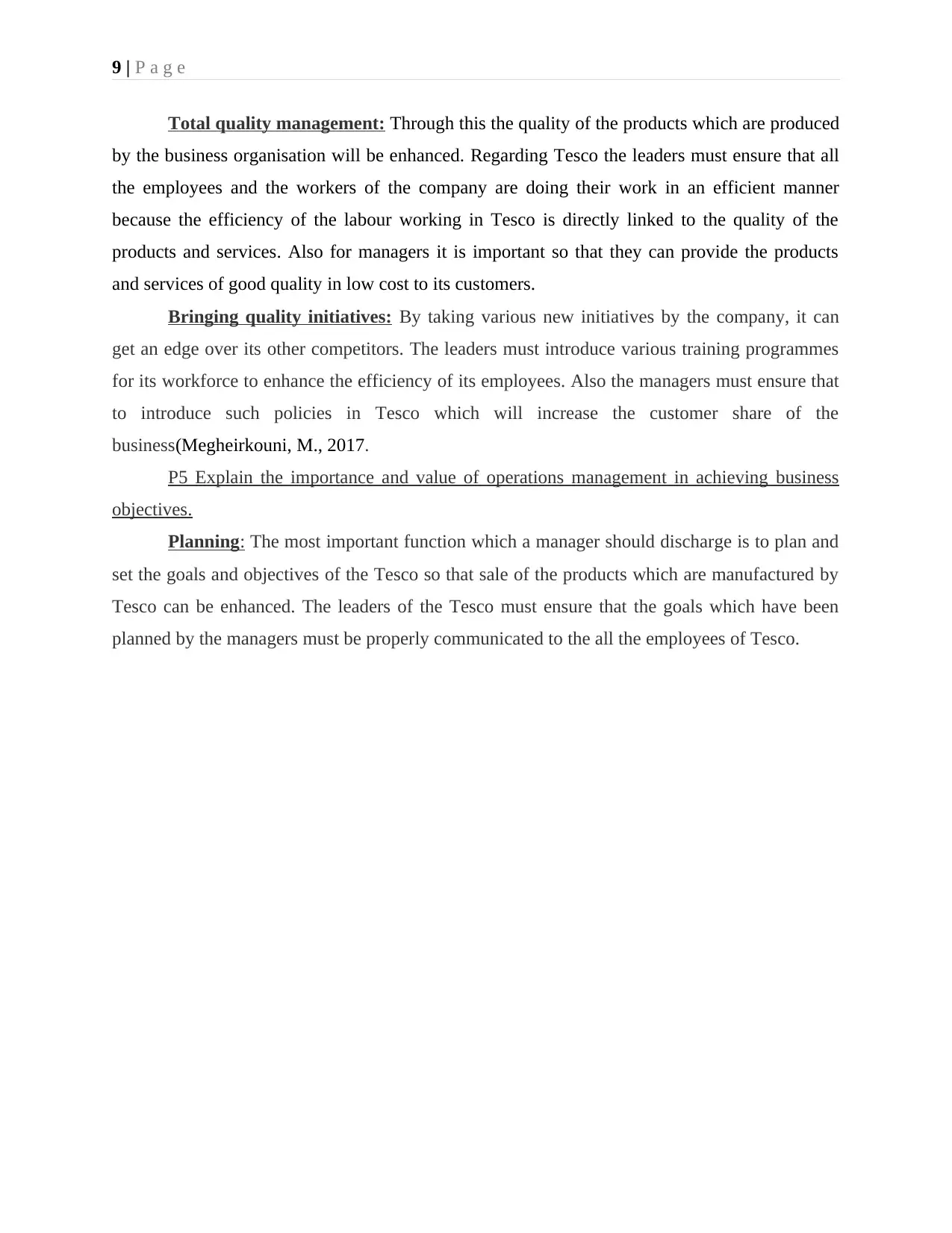
9 | P a g e
Total quality management: Through this the quality of the products which are produced
by the business organisation will be enhanced. Regarding Tesco the leaders must ensure that all
the employees and the workers of the company are doing their work in an efficient manner
because the efficiency of the labour working in Tesco is directly linked to the quality of the
products and services. Also for managers it is important so that they can provide the products
and services of good quality in low cost to its customers.
Bringing quality initiatives: By taking various new initiatives by the company, it can
get an edge over its other competitors. The leaders must introduce various training programmes
for its workforce to enhance the efficiency of its employees. Also the managers must ensure that
to introduce such policies in Tesco which will increase the customer share of the
business(Megheirkouni, M., 2017.
P5 Explain the importance and value of operations management in achieving business
objectives.
Planning: The most important function which a manager should discharge is to plan and
set the goals and objectives of the Tesco so that sale of the products which are manufactured by
Tesco can be enhanced. The leaders of the Tesco must ensure that the goals which have been
planned by the managers must be properly communicated to the all the employees of Tesco.
Total quality management: Through this the quality of the products which are produced
by the business organisation will be enhanced. Regarding Tesco the leaders must ensure that all
the employees and the workers of the company are doing their work in an efficient manner
because the efficiency of the labour working in Tesco is directly linked to the quality of the
products and services. Also for managers it is important so that they can provide the products
and services of good quality in low cost to its customers.
Bringing quality initiatives: By taking various new initiatives by the company, it can
get an edge over its other competitors. The leaders must introduce various training programmes
for its workforce to enhance the efficiency of its employees. Also the managers must ensure that
to introduce such policies in Tesco which will increase the customer share of the
business(Megheirkouni, M., 2017.
P5 Explain the importance and value of operations management in achieving business
objectives.
Planning: The most important function which a manager should discharge is to plan and
set the goals and objectives of the Tesco so that sale of the products which are manufactured by
Tesco can be enhanced. The leaders of the Tesco must ensure that the goals which have been
planned by the managers must be properly communicated to the all the employees of Tesco.
⊘ This is a preview!⊘
Do you want full access?
Subscribe today to unlock all pages.

Trusted by 1+ million students worldwide
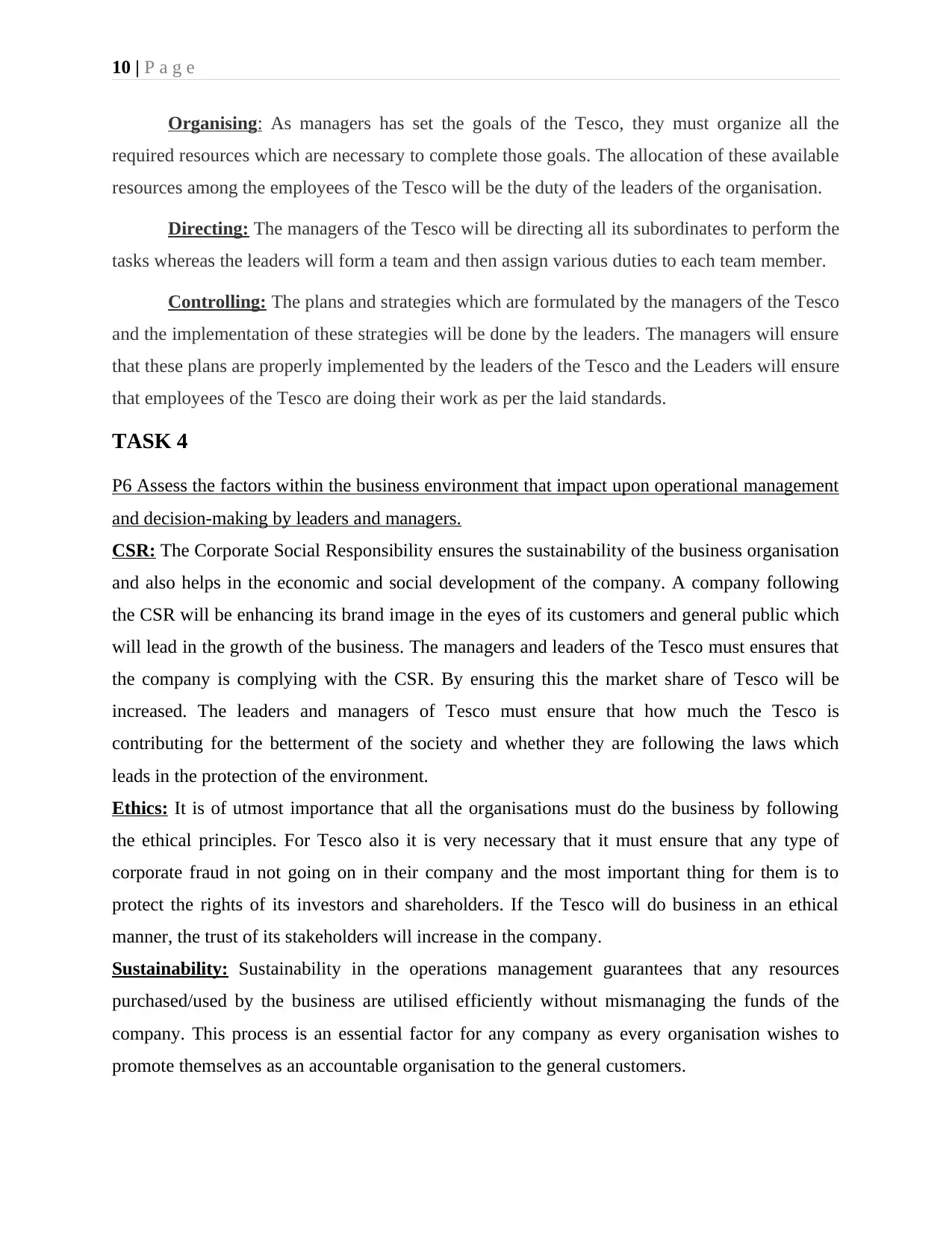
10 | P a g e
Organising: As managers has set the goals of the Tesco, they must organize all the
required resources which are necessary to complete those goals. The allocation of these available
resources among the employees of the Tesco will be the duty of the leaders of the organisation.
Directing: The managers of the Tesco will be directing all its subordinates to perform the
tasks whereas the leaders will form a team and then assign various duties to each team member.
Controlling: The plans and strategies which are formulated by the managers of the Tesco
and the implementation of these strategies will be done by the leaders. The managers will ensure
that these plans are properly implemented by the leaders of the Tesco and the Leaders will ensure
that employees of the Tesco are doing their work as per the laid standards.
TASK 4
P6 Assess the factors within the business environment that impact upon operational management
and decision-making by leaders and managers.
CSR: The Corporate Social Responsibility ensures the sustainability of the business organisation
and also helps in the economic and social development of the company. A company following
the CSR will be enhancing its brand image in the eyes of its customers and general public which
will lead in the growth of the business. The managers and leaders of the Tesco must ensures that
the company is complying with the CSR. By ensuring this the market share of Tesco will be
increased. The leaders and managers of Tesco must ensure that how much the Tesco is
contributing for the betterment of the society and whether they are following the laws which
leads in the protection of the environment.
Ethics: It is of utmost importance that all the organisations must do the business by following
the ethical principles. For Tesco also it is very necessary that it must ensure that any type of
corporate fraud in not going on in their company and the most important thing for them is to
protect the rights of its investors and shareholders. If the Tesco will do business in an ethical
manner, the trust of its stakeholders will increase in the company.
Sustainability: Sustainability in the operations management guarantees that any resources
purchased/used by the business are utilised efficiently without mismanaging the funds of the
company. This process is an essential factor for any company as every organisation wishes to
promote themselves as an accountable organisation to the general customers.
Organising: As managers has set the goals of the Tesco, they must organize all the
required resources which are necessary to complete those goals. The allocation of these available
resources among the employees of the Tesco will be the duty of the leaders of the organisation.
Directing: The managers of the Tesco will be directing all its subordinates to perform the
tasks whereas the leaders will form a team and then assign various duties to each team member.
Controlling: The plans and strategies which are formulated by the managers of the Tesco
and the implementation of these strategies will be done by the leaders. The managers will ensure
that these plans are properly implemented by the leaders of the Tesco and the Leaders will ensure
that employees of the Tesco are doing their work as per the laid standards.
TASK 4
P6 Assess the factors within the business environment that impact upon operational management
and decision-making by leaders and managers.
CSR: The Corporate Social Responsibility ensures the sustainability of the business organisation
and also helps in the economic and social development of the company. A company following
the CSR will be enhancing its brand image in the eyes of its customers and general public which
will lead in the growth of the business. The managers and leaders of the Tesco must ensures that
the company is complying with the CSR. By ensuring this the market share of Tesco will be
increased. The leaders and managers of Tesco must ensure that how much the Tesco is
contributing for the betterment of the society and whether they are following the laws which
leads in the protection of the environment.
Ethics: It is of utmost importance that all the organisations must do the business by following
the ethical principles. For Tesco also it is very necessary that it must ensure that any type of
corporate fraud in not going on in their company and the most important thing for them is to
protect the rights of its investors and shareholders. If the Tesco will do business in an ethical
manner, the trust of its stakeholders will increase in the company.
Sustainability: Sustainability in the operations management guarantees that any resources
purchased/used by the business are utilised efficiently without mismanaging the funds of the
company. This process is an essential factor for any company as every organisation wishes to
promote themselves as an accountable organisation to the general customers.
Paraphrase This Document
Need a fresh take? Get an instant paraphrase of this document with our AI Paraphraser
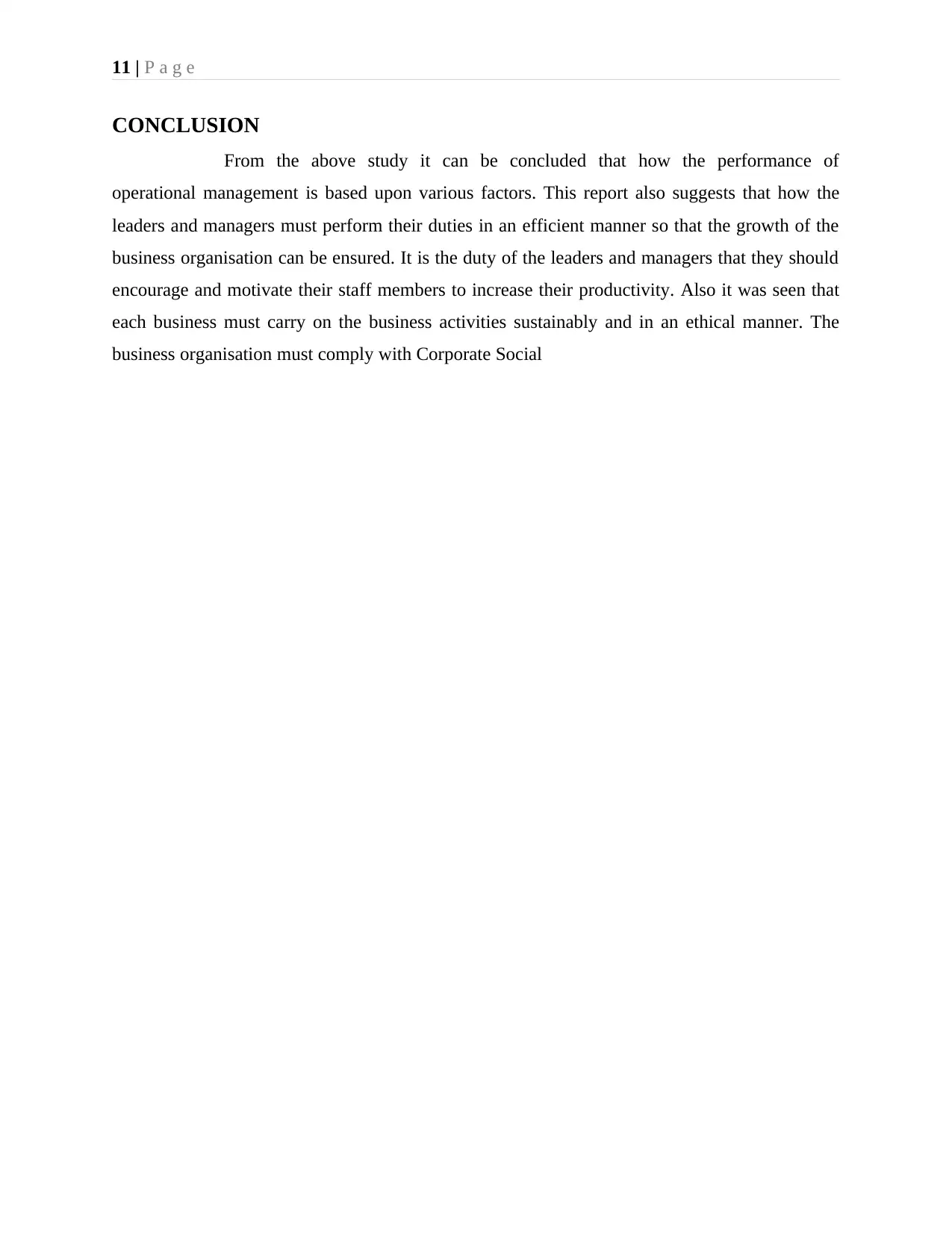
11 | P a g e
CONCLUSION
From the above study it can be concluded that how the performance of
operational management is based upon various factors. This report also suggests that how the
leaders and managers must perform their duties in an efficient manner so that the growth of the
business organisation can be ensured. It is the duty of the leaders and managers that they should
encourage and motivate their staff members to increase their productivity. Also it was seen that
each business must carry on the business activities sustainably and in an ethical manner. The
business organisation must comply with Corporate Social
CONCLUSION
From the above study it can be concluded that how the performance of
operational management is based upon various factors. This report also suggests that how the
leaders and managers must perform their duties in an efficient manner so that the growth of the
business organisation can be ensured. It is the duty of the leaders and managers that they should
encourage and motivate their staff members to increase their productivity. Also it was seen that
each business must carry on the business activities sustainably and in an ethical manner. The
business organisation must comply with Corporate Social
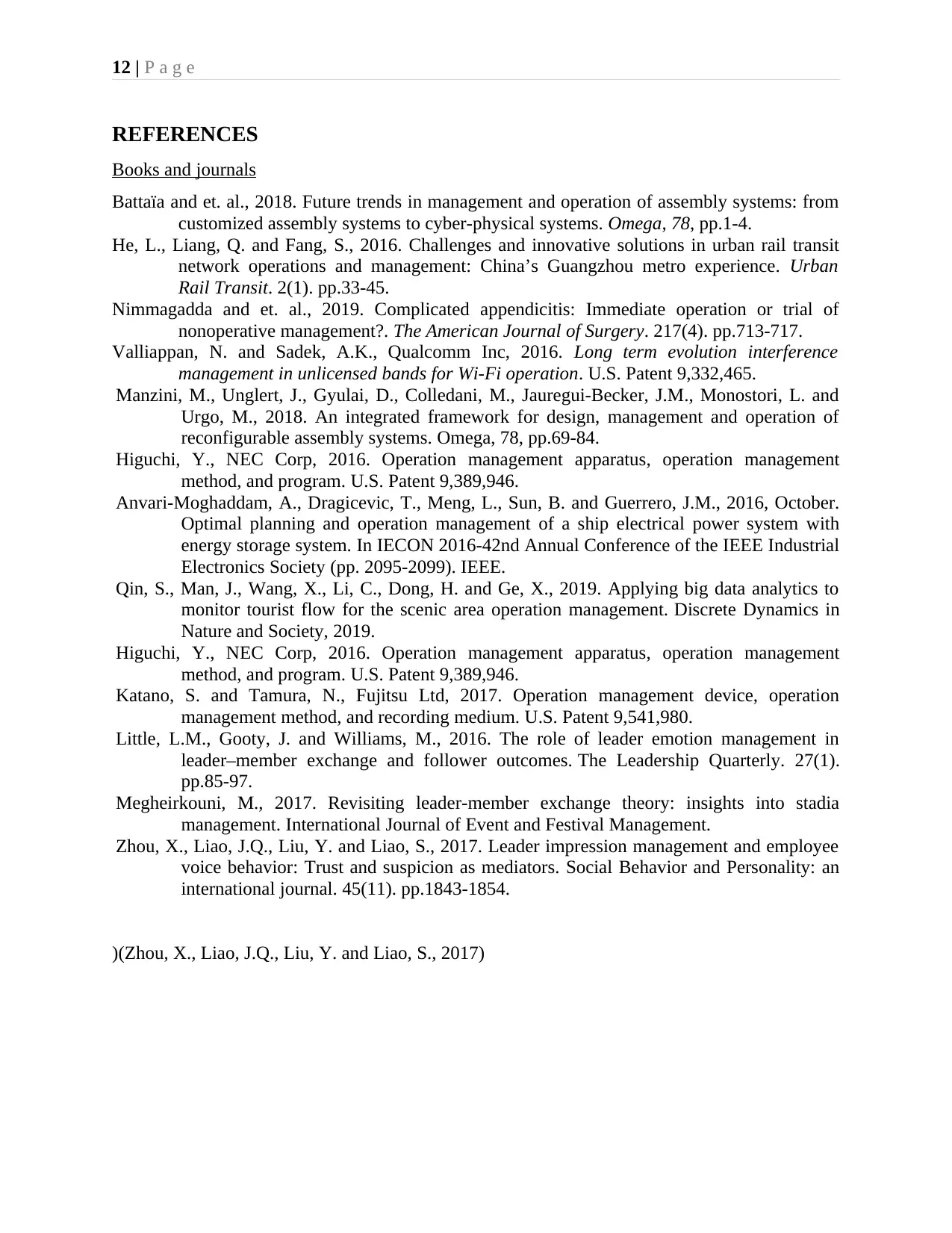
12 | P a g e
REFERENCES
Books and journals
Battaïa and et. al., 2018. Future trends in management and operation of assembly systems: from
customized assembly systems to cyber-physical systems. Omega, 78, pp.1-4.
He, L., Liang, Q. and Fang, S., 2016. Challenges and innovative solutions in urban rail transit
network operations and management: China’s Guangzhou metro experience. Urban
Rail Transit. 2(1). pp.33-45.
Nimmagadda and et. al., 2019. Complicated appendicitis: Immediate operation or trial of
nonoperative management?. The American Journal of Surgery. 217(4). pp.713-717.
Valliappan, N. and Sadek, A.K., Qualcomm Inc, 2016. Long term evolution interference
management in unlicensed bands for Wi-Fi operation. U.S. Patent 9,332,465.
Manzini, M., Unglert, J., Gyulai, D., Colledani, M., Jauregui-Becker, J.M., Monostori, L. and
Urgo, M., 2018. An integrated framework for design, management and operation of
reconfigurable assembly systems. Omega, 78, pp.69-84.
Higuchi, Y., NEC Corp, 2016. Operation management apparatus, operation management
method, and program. U.S. Patent 9,389,946.
Anvari-Moghaddam, A., Dragicevic, T., Meng, L., Sun, B. and Guerrero, J.M., 2016, October.
Optimal planning and operation management of a ship electrical power system with
energy storage system. In IECON 2016-42nd Annual Conference of the IEEE Industrial
Electronics Society (pp. 2095-2099). IEEE.
Qin, S., Man, J., Wang, X., Li, C., Dong, H. and Ge, X., 2019. Applying big data analytics to
monitor tourist flow for the scenic area operation management. Discrete Dynamics in
Nature and Society, 2019.
Higuchi, Y., NEC Corp, 2016. Operation management apparatus, operation management
method, and program. U.S. Patent 9,389,946.
Katano, S. and Tamura, N., Fujitsu Ltd, 2017. Operation management device, operation
management method, and recording medium. U.S. Patent 9,541,980.
Little, L.M., Gooty, J. and Williams, M., 2016. The role of leader emotion management in
leader–member exchange and follower outcomes. The Leadership Quarterly. 27(1).
pp.85-97.
Megheirkouni, M., 2017. Revisiting leader-member exchange theory: insights into stadia
management. International Journal of Event and Festival Management.
Zhou, X., Liao, J.Q., Liu, Y. and Liao, S., 2017. Leader impression management and employee
voice behavior: Trust and suspicion as mediators. Social Behavior and Personality: an
international journal. 45(11). pp.1843-1854.
)(Zhou, X., Liao, J.Q., Liu, Y. and Liao, S., 2017)
REFERENCES
Books and journals
Battaïa and et. al., 2018. Future trends in management and operation of assembly systems: from
customized assembly systems to cyber-physical systems. Omega, 78, pp.1-4.
He, L., Liang, Q. and Fang, S., 2016. Challenges and innovative solutions in urban rail transit
network operations and management: China’s Guangzhou metro experience. Urban
Rail Transit. 2(1). pp.33-45.
Nimmagadda and et. al., 2019. Complicated appendicitis: Immediate operation or trial of
nonoperative management?. The American Journal of Surgery. 217(4). pp.713-717.
Valliappan, N. and Sadek, A.K., Qualcomm Inc, 2016. Long term evolution interference
management in unlicensed bands for Wi-Fi operation. U.S. Patent 9,332,465.
Manzini, M., Unglert, J., Gyulai, D., Colledani, M., Jauregui-Becker, J.M., Monostori, L. and
Urgo, M., 2018. An integrated framework for design, management and operation of
reconfigurable assembly systems. Omega, 78, pp.69-84.
Higuchi, Y., NEC Corp, 2016. Operation management apparatus, operation management
method, and program. U.S. Patent 9,389,946.
Anvari-Moghaddam, A., Dragicevic, T., Meng, L., Sun, B. and Guerrero, J.M., 2016, October.
Optimal planning and operation management of a ship electrical power system with
energy storage system. In IECON 2016-42nd Annual Conference of the IEEE Industrial
Electronics Society (pp. 2095-2099). IEEE.
Qin, S., Man, J., Wang, X., Li, C., Dong, H. and Ge, X., 2019. Applying big data analytics to
monitor tourist flow for the scenic area operation management. Discrete Dynamics in
Nature and Society, 2019.
Higuchi, Y., NEC Corp, 2016. Operation management apparatus, operation management
method, and program. U.S. Patent 9,389,946.
Katano, S. and Tamura, N., Fujitsu Ltd, 2017. Operation management device, operation
management method, and recording medium. U.S. Patent 9,541,980.
Little, L.M., Gooty, J. and Williams, M., 2016. The role of leader emotion management in
leader–member exchange and follower outcomes. The Leadership Quarterly. 27(1).
pp.85-97.
Megheirkouni, M., 2017. Revisiting leader-member exchange theory: insights into stadia
management. International Journal of Event and Festival Management.
Zhou, X., Liao, J.Q., Liu, Y. and Liao, S., 2017. Leader impression management and employee
voice behavior: Trust and suspicion as mediators. Social Behavior and Personality: an
international journal. 45(11). pp.1843-1854.
)(Zhou, X., Liao, J.Q., Liu, Y. and Liao, S., 2017)
⊘ This is a preview!⊘
Do you want full access?
Subscribe today to unlock all pages.

Trusted by 1+ million students worldwide
1 out of 12
Related Documents
Your All-in-One AI-Powered Toolkit for Academic Success.
+13062052269
info@desklib.com
Available 24*7 on WhatsApp / Email
![[object Object]](/_next/static/media/star-bottom.7253800d.svg)
Unlock your academic potential
Copyright © 2020–2025 A2Z Services. All Rights Reserved. Developed and managed by ZUCOL.





